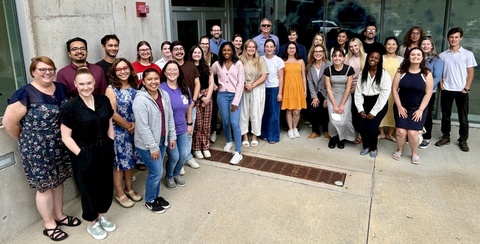
By Abby Wedemeyer
For the past decade, the Behavioral-Biomedical Interface Training Program has been providing pre-doctoral psychological and brain sciences students with in-depth training in biomedical mechanisms.
Since its start, the BBIP has received funding through a T32 pre-doctoral training grant provided by the National Institute of General Medical Sciences, part of the National Institutes of Health.
Recently, the BBIP was again awarded the T32 grant, allowing the program to continue for another five years. This is currently the only T32 training grant in the College of Liberal Arts and Sciences, which is home to the Department of Psychological and Brain Sciences.
With only five similar programs nationwide, the National Institute of General Medical Sciences grant recognizes organizations actively working to bridge the gap between behavioral and biomedical sciences.
The BBIP directors, professors Susan Lutgendorf and Daniel Tranel, and associate professor Michelle Voss, explained the uniqueness of the program and its efforts.
“One of our goals is to give behavioral science students in-depth training in how people in the biomedical sciences think, design experiments, interpret data, and write manuscripts so that our students will be poised to bridge these fields in making discoveries in the future,” Lutgendorf said. “This grant offers students the opportunity to have state-of-the-art training in both behavioral and biomedical laboratories.”
The idea for the BBIP was first initiated in part due to the close geographical proximity of the psychological and brain sciences department and the Carver College of Medicine and its laboratories. Only a 20-minute walk between the two is a luxury that “isn’t always a given” at other universities, Voss said.
“We set up this program to provide a bridge across the two sides of the campus and specifically to promote the mechanism by which graduate students would be literal bridges by going back and forth across the river,” explained Tranel.
For example, Voss’ students are given the opportunity “to do rotations in a lab that specializes in sampling the blood or measuring specific proteins in the blood that are either risk factors or protective factors for the brain.”
Lutgendorf’s students study how stress hormones are related to cancer progression, with students rotating in labs of cancer biologists and stress physiologists.
The BBIP is composed of 24 biomedical graduate student mentors alongside 21 mentors from the PBS department, and there are 28 students currently enrolled in the program.
In addition to students funded by the grant, many others are able to benefit from the program through a variety of training activities.
Lutgendorf explained, however, that it’s not only the grant that has helped provide students with these hands-on opportunities.
“It’s really putting together the energies, talents, and resources of people, faculty from both sides of campus that enables us to do this,” Lutgendorf said, citing the PBS department, CLAS, the Graduate College, Office of the Vice President for Research, the Carver College of Medicine, and the Iowa Neuroscience Institute as other major contributors to the success of the BBIP.
Learn more about BBIP’s mission and outcomes online.